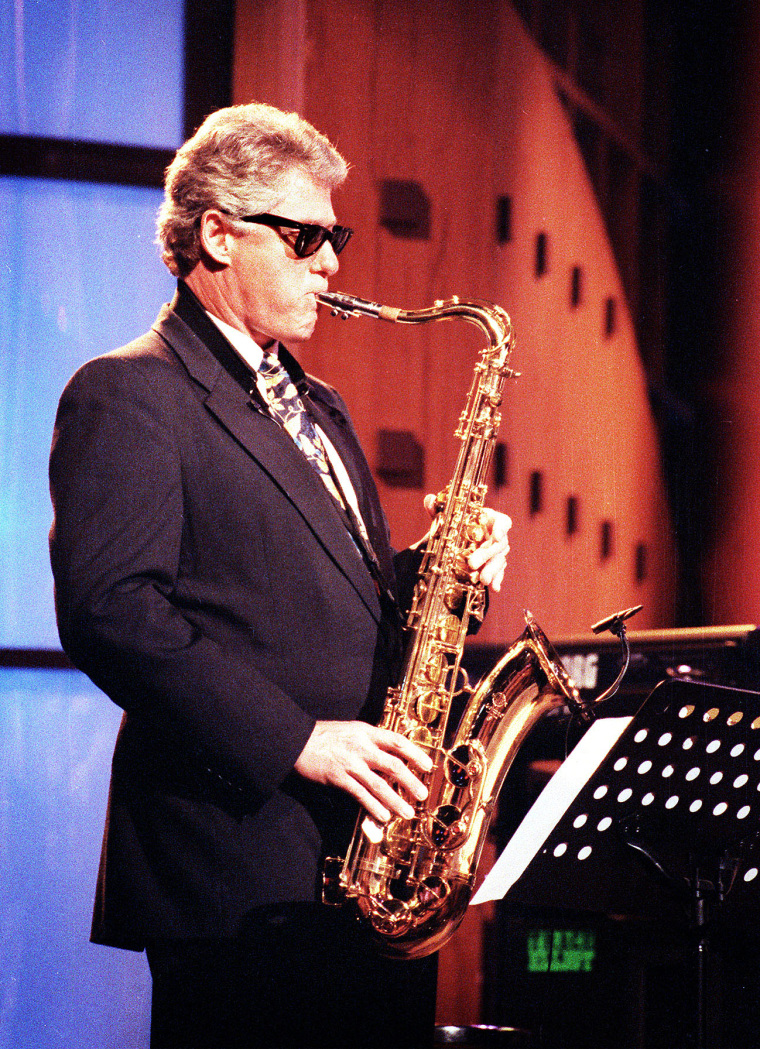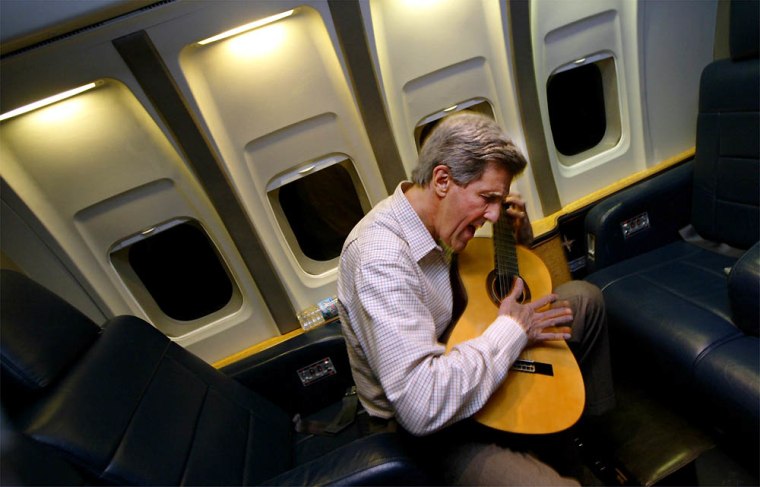Sen. John Kerry has been in hot pursuit of a multi-generational mandate, even before "Super Tuesday's" near-sweep of nine of 10 state primaries. But the evidence isn't in victories at the polls. You can hear it in the music at the rallies.
Popular music: Candidates swear by it as a way to connect with the electorate and inspire the beleaguered campaign worker. Songs at rallies in the 2004 campaign have been no exception.
The soundtrack for the 2004 race has so far been eclectic, with rock and soul music intended to speak to younger voters; older voters for whom the music resonates as personal history; and, significantly, those who don’t vote -- a sizable block of the population being courted with more urgency this election year.
This year’s Democratic campaign jukebox employs the full range of musical expressions -- from U2 to John Mellencamp, Santana to David Bowie, Martha & the Vandellas to R.E.M. And in the Democratic song selection, there’s no escaping a recurrent theme of regaining lost opportunities, and making the most of second chances -- a post-traumatic reaction to the hotly contested outcome of the 2000 election.
Rock-and-roll war veteran
Kerry, a five-times decorated Vietnam veteran -- and the first serious Democratic presidential contender to fight in what’s been called America’s first rock-and-roll war -- is understandably at home with rock, and reportedly keeps the Beatles’ “Abbey Road” at the ready in private.
The Kerry camp has frequently played U2’s triumphal “Beautiful Day” at several of its campaign rallies.
It’s a beautiful day
Don’t let it get away
The Massachusetts senator was introduced at a Feb. 25 rally in Minnesota with “Right Now,” Van Halen’s song praising making the most of an opportunity:
Hey! It’s your tomorrow
(Right now) Come on, it’s everything
(Right now) Catch your magic moment
Do it right here and now
It means everything
Not backing down
Kerry’s also used Bruce Springsteen’s “The Rising,” an especially topical choice considering its inspirational source: the Sept. 11, 2001 terrorist attacks on the United States. And Kerry has borrowed music that invokes themes of standing up to an unspoken enemy. Springsteen’s “No Surrender” pops up from time to time; as well as “I Won’t Back Down” by Tom Petty and the Heartbreakers:
Hey baby
There ain’t no easy way out
Hey baby
Hey I will stand my ground
and I won’t back down
Before withdrawing from the race Wednesday, North Carolina Sen. John Edwards (said by The Associated Press to favor “The Essential Bruce Springsteen” for his easy listening) made his own pitch for generational gravitas, using (among others) John Mellencamp’s music.
Edwards, who made much in stump speeches of his small-town roots as a millworker’s son, frequently used Mellencamp’s 1985 wheatfields-and-cheerleaders anthem “Small Town”:
Educated in a small town
Taught the fear of Jesus in a small town
Used to daydream in that small town
Another boring romantic that’s me
At other rallies Edwards used Mellencamp’s 1998 song “Your Life Is Now” :
Your life is now your life is now your life is now
In this undiscovered moment
Lift your head up above the crowd
We could shake this world
If you would only show us how
Your life is now
Would you teach your children to tell the truth
Would you take the high road if you could choose
Do you believe you’re a victim of a great compromise
And literally moments before he pulled out, the Edwards campaign jukebox was spinning some of popular music’s greatest hits: Sister Sledge’s “We Are Family,” Martha & the Vandellas’ Motown classic “Dancing in the Streets,” and Credence Clearwater Revival’s “Fortunate Son.” U2 turned up again -- this time it was the songs “Walk On” and “In the Name of Love.”
Music from all over
Both Kerry and Edwards campaigns have included songs by Free (“All Right Now”), Santana (“Everything’s Coming Our Way”), David Bowie (“Young Americans”) and, curiously, R.E.M. (“Orange Crush”).
The choices reflect, well, a democracy that’s been part of the party’s political history and its musical tastes. In 1988, nominee Michael Dukakis used Neil Diamond’s “Coming to America” to reinforce his own Greek immigrants’ roots, and to underscore the big-tent philosophy of inclusion that’s long been a Democratic tenet.
The Democrats’ borrowing of Fleetwood Mac’s “Don’t Stop” as a Clinton-Gore theme song in 1996 and again in 2000 marked some turning point in presidential campaigns and their use of pop music as a way to get a populist point across.
Resonating with the public
For Sam Craig, a marketing professor with the Stern School of Business at New York University, and a longtime student of popular culture, it’s about resonating with a broad cross-section of the public. “Young voters are increasingly important to determine the outcome of political elections, since older voters have largely made up their minds who to vote for,” he said.
“How do [candidates] identify with someone 18, 19, 20, 21 years old? They need to build a bond, and one of the quickest, easiest ways to do it is using music that younger voters resonate with,” said Craig, who heads the Stern School’s Entertainment, Media & Technology Program.
Use of music as emotional galvanizer has a history outside politics; the labor movement adopted the songs “Bread and Roses” and “Joe Hill” to inspire textile workers and laborers in the early 20th century; Craig mentioned the use of “We Shall Overcome” as a veritable anthem during the era of the civil rights movement.
Music in the 2004 campaign is different, he said. “This is music less representing a movement or a cause and more representing a bond and a relationship,” Craig said.
Some might think borrowing music from a younger generation for political use amounts to pandering; Craig sees it as a necessary expedient of American politics.
“You wouldn’t play Lawrence Welk,” he said.
For both the captive audience of campaign workers and those who attend the rallies, Craig said, the songs are “just providing entertainment, so it’s hard to be cynical about it. Cynicism is a response to an obvious ploy or a message they feel is insincere. Here [workers and supporters] are there for a reason.
“Oh, there may be a heckler or two,” Craig noted. “But mostly they’re there because they have beliefs consistent, or at least marginally consistent, with a candidate. And while they’re waiting for the candidate, they’re entertained.”
John Kerry on bass! Bill Clinton on sax!
The transgenerational themes extend to the instruments candidates or incumbents have played through the years.

Kerry has real credentials as a musician. In this campaign, the Massachusetts senator’s been seen playing an acoustic guitar -- that most populist of instruments, resonant with anyone who remembers Pete Seeger or The Weavers, Woody Guthrie or pre-Newport ’65-mode Bob Dylan.
And his musical education didn’t just start this year. While a student at St. Paul’s, an elite New Hampshire prep school, the senator played bass for the Electras, a group he started with classmates there. A copy of the group’s 1961 Ventures-inspired album recently fetched more than $2,500 on eBay; there are plans for a reissue, Newsweek reported in February.
“Before he took off for Yale and then Vietnam and then a career in politics, Kerry flailed away at a bass guitar with a few schoolmates, playing primitive instrumental covers in the tradition of surf bands like The Ventures and dawn-of-rock stars like Eddie Cochran,” The Washington Post reported last month.
And there’s no forgetting Bill Clinton’s 1992 appearance on the “Arsenio Hall Show,” with the future commander-in-chief playing the saxophone, Ray-Bans in place. That appearance rewrote the rules of decorum for presidential aspirants; late-night talk shows were suddenly a viable, even hot, avenue for political appearances.
President Richard Nixon played standards on the White House piano, if not on the campaign trail -- “God Bless America” and “Auld Lang Syne” were reportedly two of his favorites.
‘Hail,’ yes
Not exactly the hippest music around. But in every campaign and for every party -- the Democrats and surely the Republican effort now ramping up to re-elect President Bush -- it’s all an attempt to position the candidate in the public eye, to get them ready to hear the big song, that 190-year-old ditty originally written by James Sanderson for a stage adaptation of a poem by Sir Walter Scott.
And the candidates would probably agree: Banging away on the guitar or sax is great, but there’s no instrument that plays like the United States Marine Band.
Rock and roll is fine, but nothing beats being on the receiving end of “Hail to the Chief.”
